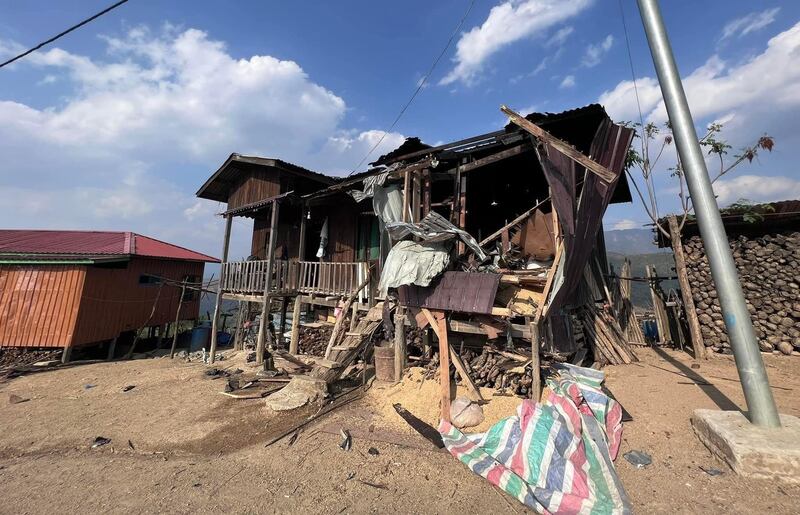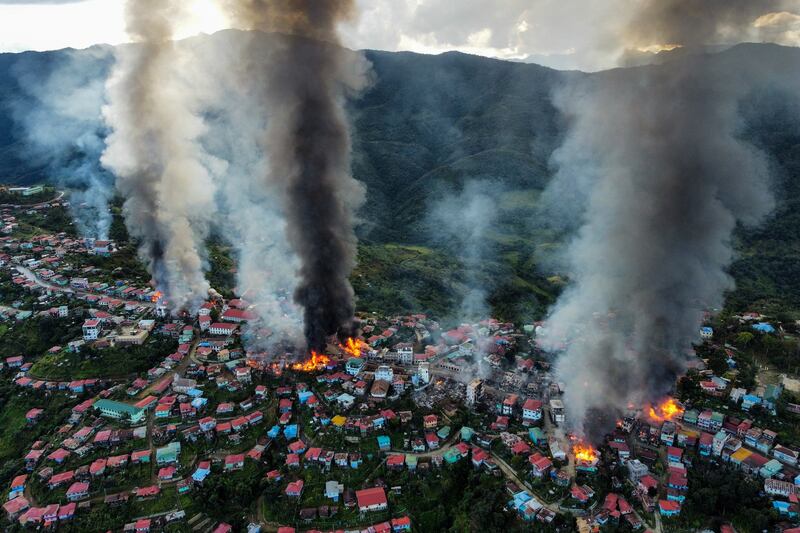Western Myanmar’s once bustling town of Thantlang, with a sign above its gateway proclaiming that its inhabitants are “Not rich, but happy,” now lies in ruin after an onslaught of military raids, arson attacks, and airstrikes.
Two years after the military seized power in a coup d’etat, the Chin state township on the border of India’s Mizoram state is a shell of its former self. A resident who, like others RFA Burmese spoke with for this report, declined to be named out of security concerns, said the once bustling hub is now little more than a smoking ash heap.
“Our town is in dead silence as all residents have fled,” he said. “The only thing we hear from the area is gunshots and bomb blasts. It was a growing town before the military coup but it is now a deserted ruin.”
The inhabitants of Thantlang were quick to oppose the Feb. 1, 2021 coup and by September of that year had formed several anti-junta People’s Defense Force groups to counter a military offensive in the region.
Clashes between the two sides broke out on Sept. 19, 2021, during which junta troops shot and killed a Christian religious leader as he tried to put out fires in the township. Slightly more than a month later, junta soldiers returned to Thantlang and burned down two churches and at least 164 homes.
The September and October attacks sent more than 10,000 people – the entire population of Thantlang – fleeing to nearby villages and across the border into India, residents told RFA.
Since then, the military has returned several times to raze the township, including on June 9, 2022, when soldiers torched the decades-old Thantlang Baptist Church and set fire to homes.
The Chin National Front claims that in the two years since the coup, the junta launched more than 140 airstrikes on Thantlang, destroying many of the town’s buildings, including the CNF’s headquarters. The Thantlang PDF says junta troops have fired more than 100 heavy artillery shells at the town in 2023 alone.

In February, a member of the Thantlang PDF documented the destruction in a video, which he shared with RFA, claiming that “two-thirds of the town has been reduced to ashes because of [junta] arson.”
“The junta soldiers have raided and looted the remaining houses,” he said at the time. “They took whatever they wanted including rice, food, household items and everything ... Only empty houses remain there.”
Airstrike on Khuabung village
The latest attack took place on Thursday, when two jets dropped bombs on Thantlang’s Khuabung village, around five miles (8 kilometers) from the township seat. The airstrike killed at least eight residents, including a six- and nine-year-old, and injured 20 others. It also set fire to multiple structures.
Salai Htet Ni, the spokesman for the ethnic Chin National Front, told RFA that Thursday’s attacks were unprovoked and intentionally targeted a civilian population.
“There is no member of [the armed resistance] in the location where the military junta dropped bombs – it was just a civilian village,” he said, calling the regime “a terrorist organization.”
“This attack is the proof of what [junta chief Senior Gen.] Min Aung Hlaing said in his Armed Forces Day speech, that he is ‘taking decisive action.’ They are just targeting innocent civilians and this is part of an attempt to wipe our Chin ethnic group from the face of the earth.”
The junta has not released any information about why it attacked Khuabung, and attempts by RFA to reach Thant Zin, the junta’s social affairs minister and spokesman for Chin state, went unanswered Friday.

Salai Mang Hrang Lian, an official with the Chin Human Rights Group, told RFA that targeting civilians and burning down religious buildings are “war crimes.”
“No one is allowed to target and attack innocent civilians, religious buildings like churches, hospitals and schools,” he said. “This is the universal code of military conduct and the international basic rule of the law of armed conflict … The fact that the junta has committed war crimes is made clear when considering the incidents in Thantlang.”
Chin state under attack
And while the destruction in Thantlang is significant, it is only a small part of what the military has done in Chin state and elsewhere in Myanmar.
According to Chin civil groups, there are currently around 60,000 people displaced by conflict in Chin state, and around 50,000 others who have fled across the border to India’s Mizoram and Manipur states. The 60,000 inside Chin are part of an estimated 1.7 million refugees in Myanmar, the United Nations Office for the Coordination of Humanitarian Affairs said this month.
Junta troops have killed nearly 400 people, including civilians and PDF members, and destroyed more than 4,300 homes in Chin state since the coup, according to the Institute of Chin Affairs. Thailand’s Assistance Association for Political Prisoners (Burma) says that authorities in Myanmar have killed at least 3,194 civilians since the takeover – mostly during peaceful anti-junta protests.
Speaking to RFA on Friday, a resident of Thantlang who fled fighting there said he would never forgive the junta for what it did to his town.
“Thantlang was a great town before the military came into power,” he said. “Business was booming with many grocery stores and tea shops on each roadside. It was a bustling town and people enjoyed living there. But it has been reduced to ashes and now all I have left is bitterness toward the junta.”
Translated by Myo Min Aung. Edited by Joshua Lipes and Matt Reed.
